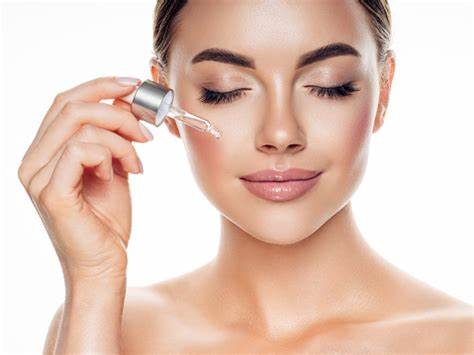ባኩቺዮል ምንድን ነው?
እንደ ናዛሪያን ገለጻ፣ ከእፅዋቱ ውስጥ የተወሰኑት ንጥረ ነገሮች እንደ ቪቲሊጎ ያሉ በሽታዎችን ለማከም ጥቅም ላይ ይውላሉ፣ ነገር ግን ከእፅዋቱ ውስጥ ባኩቺዮልን መጠቀም በጣም የቅርብ ጊዜ ልምምድ ነው።
በ2019 በተደረገ ጥናት፣ በሬቲኖል እና በባኩቺዮል መካከል መጨማደድን እና ከፍተኛ የቆዳ ቀለምን በማከም ረገድ ምንም ልዩነት አልተገኘም።2 የሬቲኖል ተጠቃሚዎች ግን የቆዳ መድረቅ እና መቆጣት አጋጥሟቸዋል። “ሌሎች ጥናቶችም በባኩቺዮል ላይ ባሉ መስመሮች/መጨማደድ፣ ቀለም መቀባት፣ የመለጠጥ ችሎታ እና ጥንካሬ ላይ መሻሻል አሳይተዋል” ሲል ቻሌክ አክሏል።
የባኩቺዮል ለቆዳ ጥቅሞች
ጥሩ ይመስላል፣ አይደል? ቀደም ሲል እንደተጠቀሰው፣ ባኩቺዮል እንደ ሬቲኖል ቀጭን መስመሮችን፣ መጨማደድን እና ያልተስተካከለ የቆዳ ቀለምን በማነጣጠር ረገድ ውጤታማ ብቻ አይደለም፤ እንዲሁም ብዙም የሚያበሳጭ አይደለም። “እንደ ሬቲኖል ሁሉ፣ ባኩቺዮል በቆዳ ሴሎች ውስጥ ያለውን የጄኔቲክ መንገድ ለቆዳ ጤና እና ለእርጅና መከላከያ ጠቃሚ የሆኑ በርካታ የኮላጅን ዓይነቶችን ይፈጥራል” ይላል ናዛሪያን። ሆኖም ግን፣ ግትር ድርቀት ወይም ብስጭት አያስከትልም። በተጨማሪም፣ ቆዳን ለፀሐይ የበለጠ ስሜታዊ ሊያደርገው ከሚችለው ሬቲኖል በተለየ (ሁልጊዜ በቀን ውስጥ SPF መልበስዎን ያረጋግጡ)፣ ባኩቺዮል ቆዳን ለፀሐይ ጎጂ ጨረሮች ተጋላጭ እንዳይሆን ሊረዳ ይችላል።
ቀደም ሲል በብሪቲሽ ጆርናል ኦፍ ደርማቶሎጂ ላይ በተጠቀሰው ጥናት መሠረት፣ ከ12 ሳምንታት በኋላ፣ ባኩቺዮል የታከሙ ግለሰቦች በአጠቃላይ በመሸብሸብ፣ በቀለም መቀባት፣ በመለጠጥ እና በፎቶ ጉዳት ላይ ከፍተኛ መሻሻል አሳይተዋል።2 ቶማስ አክሎ፣ ከእርጅና እና ከኢንፍላማቶሪ ባህሪያቱ በተጨማሪ ባኩቺዮል የብጉር መከላከያ ባህሪያትን ያሻሽላል።
የቆዳ ቀለምን እኩል ያደርገዋል;
ባኩቺዮል በቆዳ ላይ ዘልቆ በመግባት የጥቁር ነጠብጣቦችን ወይም ከፍተኛ የቆዳ ቀለም ያላቸውን ቦታዎች ገጽታ ይቀንሳል።
የጥቃቅን መስመሮችን ገጽታ ይቀንሳል፤
ልክ እንደ ሬቲኖል፣ ባኩቺዮል ሴሎችዎ እንደገና እንዲድሱ እና ኮላጅን እንዲሠሩ ይነግራቸዋል፣ ቆዳዎን “ያጎለብታል” እና የመስመሮችን እና የመሸብሸቦችን ገጽታ ይቀንሳል።
ደረቅነት ወይም ብስጭት አያስከትልም;
ሬቲኖል እና ሌሎች የቆዳ እንክብካቤ ንጥረ ነገሮች ቆዳን ሊያደርቁ ወይም ብስጭት ሊያስከትሉ ቢችሉም፣ ባኩቺዮል የበለጠ ረጋ ያለ እና ምንም አይነት ብስጭት እንደማያስከትል አይታወቅም።
የቆዳ ሴሎችን እንደገና ማደስን ያፋጥናል;
ባኩቺዮል የኮላጅን ምርት እና የሕዋስ ዝውውርን ለማሳደግ ጊዜው አሁን እንደሆነ ለሴሎችዎ ምልክቶችን ይልካል።
ለሁሉም የቆዳ ዓይነቶች ተስማሚ;
በቆዳ ላይ ገር ስለሆነ፣ አብዛኛው ሰው ባኩቺዮልን መጠቀም ይችላል።
ቆዳን ለማለስለስና ለማለስለስ ይረዳል፤
ባኩቺዮል የሕዋስ ሽግግርን እና ጤናማ የሕዋስ እድሳትን በማበረታታት ቆዳዎን ከውስጥ ወደ ውጭ ለማለስለስ እና ለመፈወስ ሊረዳ ይችላል።
የባኩቺዮል የጎንዮሽ ጉዳቶች
ቶማስ በአሁኑ ጊዜ “ምንም ያልተፈለጉ ወይም አሉታዊ የጎንዮሽ ጉዳቶችን የሚያንፀባርቁ የታወቁ ጥናቶች የሉም” ብለዋል። ናዛሪያን ቢስማማም፣ አሁንም በአንጻራዊነት አዲስ ምርት እንደሆነ አክላለች።
“ሬቲኖል ስላልሆነ፣ በእርግዝና እና ጡት በማጥባት ጊዜ ደህንነቱ የተጠበቀ የመሆን አቅም አለው” ትላለች። ከመጸጸት ይልቅ ሁልጊዜ ደህንነትን መጠበቅ የተሻለ ነው፣ ስለዚህ ተጨማሪ ጥናቶችን እንዲጠብቁ ትመክራለች።
ባኩቺዮል በእርግዝና ወቅት ወይም ጡት በማጥባት ጊዜ ደህንነቱ የተጠበቀ መሆኑን ለማረጋገጥ ወደ ውጭ መውጣት።
ተደጋጋሚ ጥያቄዎች
ባኩቺዮልን ከሬቲኖል ይልቅ ለምን ትጠቀማለህ?
ልክ እንደ ሬቲኖል፣ ባኩቺዮል የቆዳ ጥንካሬን እና የመለጠጥ ችሎታን በማሻሻል ቀጭን መስመሮችን እና መጨማደድን ለመከላከል ይረዳል።3 ሆኖም ግን፣ ከሬቲኖል በተለየ መልኩ፣ ባኩቺዮል ተፈጥሯዊ እና ቪጋን ነው።
ባኩቺዮል እንደ ሬቲኖል ውጤታማ ነው?
ከሬቲኖል ያነሰ የሚያበሳጭ ከመሆኑም በላይ ባኩቺዮል እንደ ሬቲኖል ውጤታማ ሆኖ ተገኝቷል።2 ለስሱ ቆዳ ወይም እንደ መግቢያ ደረጃ ምርት በጣም ጥሩ መፍትሄ ነው።
ባኩቺዮልን በቆዳ ላይ እንዴት መቀባት ይቻላል?
ባኩቺዮል የሴረም ወጥነት ስላለው እርጥበት ከማስገባቱ በፊት በተጸዳ ቆዳ ላይ መቀባት አለበት (ከእርጥበት ማድረቂያው ቀጭን ስለሆነ) እና በቀን እስከ ሁለት ጊዜ መቀባት ደህንነቱ የተጠበቀ መሆን አለበት።
የፖስታ ሰዓት፡ ግንቦት-20-2022
